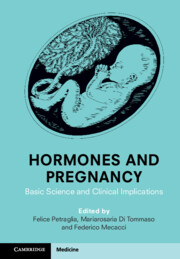Book contents
- Hormones and Pregnancy
- Hormones and Pregnancy
- Copyright page
- Contents
- Contributors
- Section I Hormones in the Physiology and Pharmacology of Pregnancy
- Section II Hormones and Gestational Disorders
- Chapter 8 Prolactin, Prolactinoma, and Pregnancy
- Chapter 9 Growth Hormone Disorders in Pregnancy
- Chapter 10 Gestational Diabetes
- Chapter 11 Obesity and Metabolic Syndrome in Pregnancy
- Chapter 12 Hormones and Pre-term Birth
- Chapter 13 Thyroid Dysfunction in Pregnancy and Postpartum
- Chapter 14 The Role of Hormones in Hypertensive Disorders of Pregnancy
- Chapter 15 Adrenal Disease in Pregnancy
- Chapter 16 Hormones and Multiple Pregnancy
- Chapter 17 Hormones in Pregnancy and the Developmental Origins of Health and Disease
- Index
- References
Chapter 13 - Thyroid Dysfunction in Pregnancy and Postpartum
from Section II - Hormones and Gestational Disorders
Published online by Cambridge University Press: 09 November 2022
- Hormones and Pregnancy
- Hormones and Pregnancy
- Copyright page
- Contents
- Contributors
- Section I Hormones in the Physiology and Pharmacology of Pregnancy
- Section II Hormones and Gestational Disorders
- Chapter 8 Prolactin, Prolactinoma, and Pregnancy
- Chapter 9 Growth Hormone Disorders in Pregnancy
- Chapter 10 Gestational Diabetes
- Chapter 11 Obesity and Metabolic Syndrome in Pregnancy
- Chapter 12 Hormones and Pre-term Birth
- Chapter 13 Thyroid Dysfunction in Pregnancy and Postpartum
- Chapter 14 The Role of Hormones in Hypertensive Disorders of Pregnancy
- Chapter 15 Adrenal Disease in Pregnancy
- Chapter 16 Hormones and Multiple Pregnancy
- Chapter 17 Hormones in Pregnancy and the Developmental Origins of Health and Disease
- Index
- References
Summary
Thyroid dysfunction is frequent in pregnancy. Both hyperthyroidism and hypothyroidism may be overt or subclinical. The most frequent causes of hyperthyroidism are Graves’ disease and gestational transient thyroxicosis, while chronic autoimmune thyroiditis accounts for most cases of hypothyroidism in pregnancy. Both hyperthyroidism and hypothyroidism, either overt or subclinical, may have negative consequences for the mother, the fetus/newborn, and the outcome of pregnancy. Accordingly, euthyroidism should be promptly restored and stably maintained, both in hyperthyroid pregnant women under antithyroid drug treatment and in hypothyroid pregnant women receiving levothyroxine replacement therapy. Whether a universal screening for thyroid function in women who are pregnant or are seeking pregnancy is still a matter of argument among scientific societies. After delivery postpartum thyroiditis may occur, which may be transient or result in permanent thyroid dysfunction.
- Type
- Chapter
- Information
- Hormones and PregnancyBasic Science and Clinical Implications, pp. 140 - 150Publisher: Cambridge University PressPrint publication year: 2022

